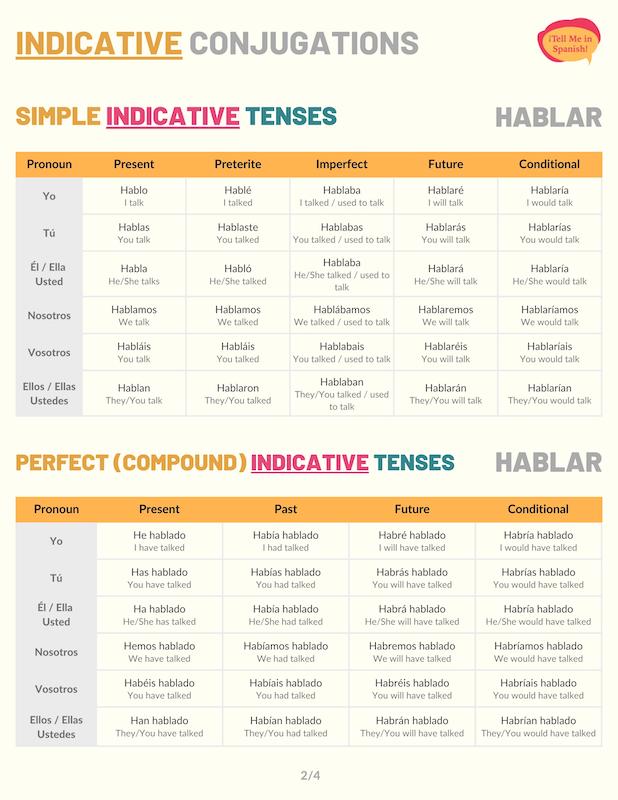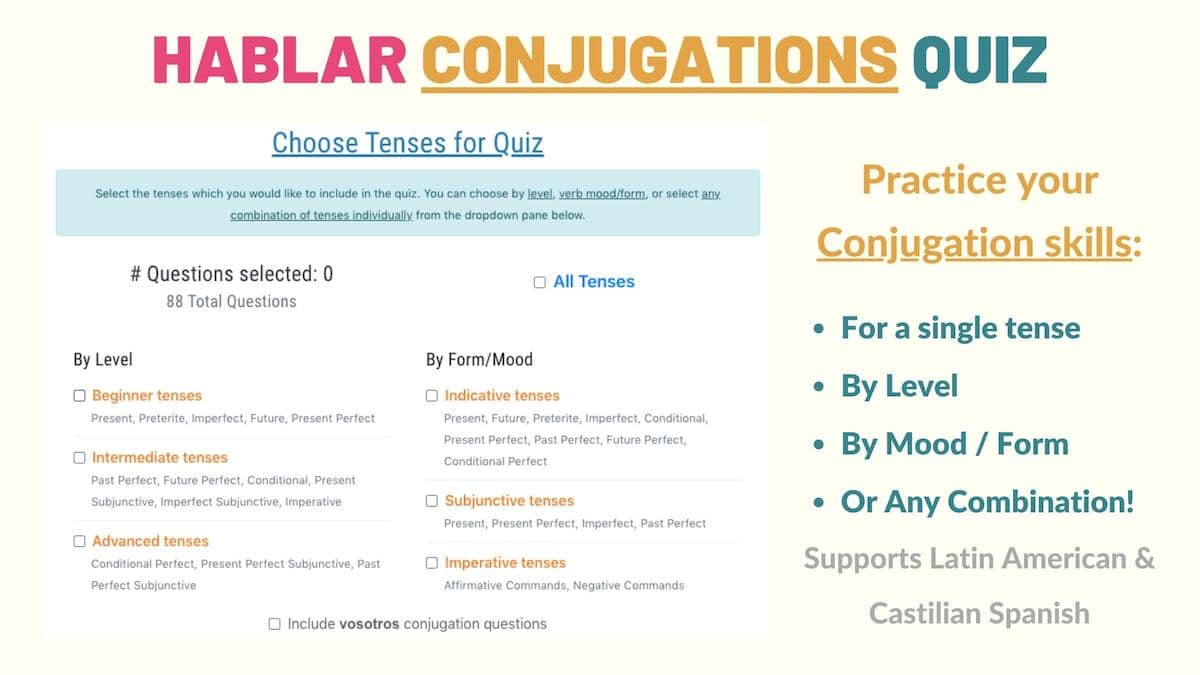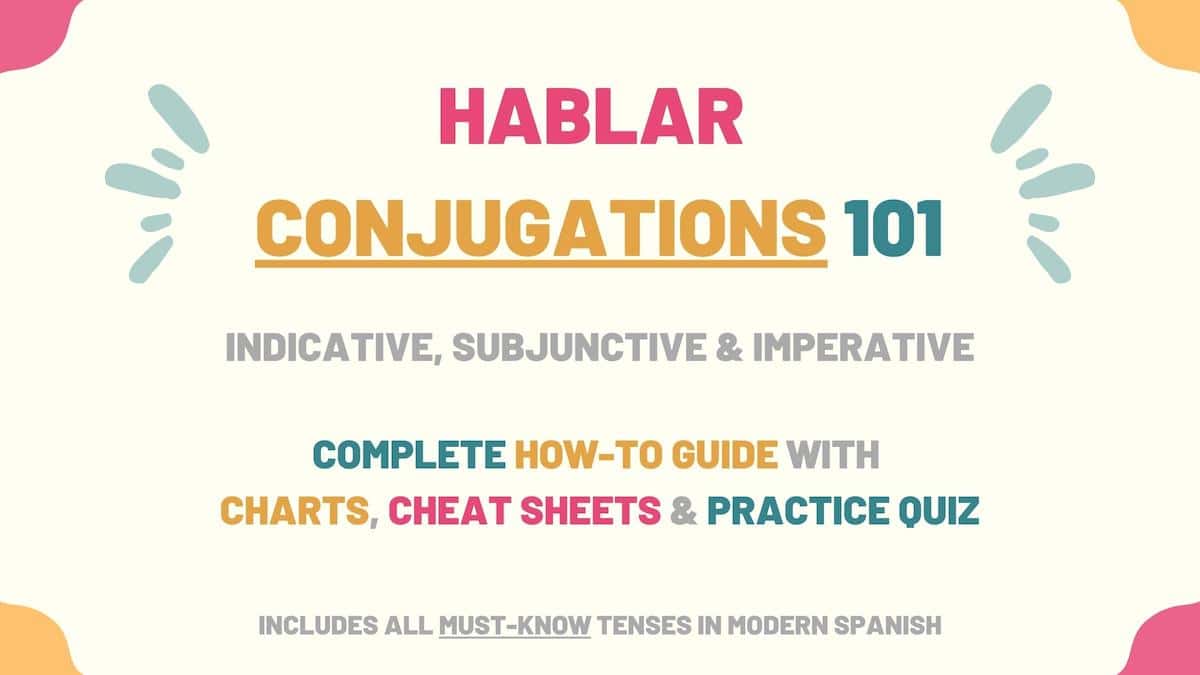Hablar is a common verb for daily life situations. To help you use it correctly, in this guide, you’ll learn how to conjugate ‘hablar’ in all of the key tenses. Here is an overview of what we’ll cover:
- Hablar Overview
- Indicative Tenses of Hablar Conjugations
- Subjunctive Tenses of Hablar Conjugations
- Imperative (Commands) of Hablar Conjugations
- Uses & Examples
- Download Hablar Conjugation Tables & Uses Cheat sheets
- Hablar Conjugation Practice Quiz
Take Note: There are many tenses in Spanish. However, we don’t use them all. Many are simply old and outdated. As a result, in this guide, you’ll only learn the tenses you need to know to become fluent in Spanish.
Overview of Hablar
| Verb Characteristic | Property |
|---|---|
| Verb Type | -AR |
| Irregular | No |
| Infinitive | Hablar |
| Gerund (Present Participle) Form | Hablando |
| Past Participle Form | Hablado |
| Synonyms | Decir, Charlar, Platicar |
Hablar can be translated as ‘to talk’ or ‘to speak’. For simplicity, we will only include the one translation in the conjugation examples included in the tables below. However, you could replace ‘to speak’ or ‘to talk’ without the conjugation being impacted.
Note: There are many tenses in Spanish. However, we don’t use them all. Some are simply old and outdated. As a result, in this guide, you’ll only learn the tenses you need to know to become fluent in Spanish.
Indicative Conjugations of Hablar
Present tense
Hablar is a regular -AR verb. The present tense of hablar can be used to talk about speaking in general and the languages you speak. For example, Julia habla español e inglés.
| Person | Conjugation | Translation |
|---|---|---|
| Yo | Hablo | I speak |
| Tú | Hablas | You speak |
| Él / Ella Usted | Habla | He/She speaks You (formal) speak |
| Nosotros | Hablamos | We speak |
| Vosotros | Habláis | You speak |
| Ellos / Ellas Ustedes | Hablan | They speak You (plural) speak |
Preterite tense
The preterite conjugation of ‘hablar’ describes how or to whom you spoke at a specific moment in the past. Hablé con Teddy hace rato.
| Person | Conjugation | Translation |
|---|---|---|
| Yo | Hablé | I spoke |
| Tú | Hablaste | You spoke |
| Él / Ella Usted | Habló | He/She spoke You (formal) spoke |
| Nosotros | Hablamos | We spoke |
| Vosotros | Hablasteis | You spoke |
| Ellos / Ellas Ustedes | Hablaron | They spoke You (plural) spoke |
Imperfect tense
The imperfect form of hablar allows you to describe the way you used to talk or speak in the past. For example, Juan hablaba muy bien español. Depending on the sentence, ‘hablar’ in the imperfect tense can be translated as ‘I used to speak/talk’ or ‘I spoke/talked’.
| Person | Conjugation | Translation |
|---|---|---|
| Yo | Hablaba | I spoke |
| Tú | Hablabas | You spoke |
| Él / Ella Usted | Hablaba | He/She spoke You (formal) spoke |
| Nosotros | Hablábamos | We spoke |
| Vosotros | Hablabais | You spoke |
| Ellos / Ellas Ustedes | Hablaban | They spoke You (plural) spoke |
Near future
The near future form of ‘hablar’ expresses talking to someone or speaking a language soon in the future. For instance: mañana voy a hablar con Jessica.
| Person | Conjugation | Translation |
|---|---|---|
| Yo | Voy a hablar | I’m going to speak |
| Tú | Vas a hablar | You’re going to speak |
| Él / Ella Usted | Va a hablar | He/She is going to speak You (formal) is going to speak |
| Nosotros | Vamos a hablar | We’re going to speak |
| Vosotros | Vais a hablar | You’re going to speak |
| Ellos / Ellas Ustedes | Van a hablar | They’re going to speak You (plural) are going to speak |
Future simple tense
The Spanish simple future refers to actions that you’ll speak with someone at some point in the future. Creo que hoy hablaré con Carlos.
| Person | Conjugation | Translation |
|---|---|---|
| Yo | Hablaré | I will speak |
| Tú | Hablarás | You will speak |
| Él / Ella Usted | Hablará | He/She will speak You (formal) will speak |
| Nosotros | Hablaremos | We will speak |
| Vosotros | Hablaréis | You (formal) will speak |
| Ellos / Ellas Ustedes | Hablarán | They will speak You (plural) will speak |
Conditional tense
The conditional form of ‘hablar’ conveys that someone would play something if certain circumstances are met. For example: si pudiéramos, hablaríamos con ella.
| Person | Conjugation | Translation |
|---|---|---|
| Yo | Hablaría | I would speak |
| Tú | Hablarías | You would speak |
| Él / Ella Usted | Hablaría | He/She would speak You (formal) would speak |
| Nosotros | Hablaríamos | We would speak |
| Vosotros | Hablaríais | You would speak |
| Ellos / Ellas Ustedes | Hablarían | They would speak You (plural) would speak |
Present perfect tense
The present perfect conjugation of ‘hablar’ is formed with the verb ‘haber’ and the participle form of ‘hablar’ (hablado). This tense expresses that you have or haven’t spoken with someone in a moment close to the present. For instance, todavía no he hablado con ella.
| Person | Conjugation | Translation |
|---|---|---|
| Yo | He hablado | I have spoken |
| Tú | Has hablado | You have spoken |
| Él / Ella Usted | Ha hablado | He/She has spoken You (formal) have spoken |
| Nosotros | Hemos hablado | We have spoken |
| Vosotros | Habéis hablado | You have spoken |
| Ellos / Ellas Ustedes | Han hablado | They have spoken You (plural) have spoken |
Past perfect
To conjugate the past perfect tense of ‘hablar’, you need to use the imperfect form of haber + hablado, which is the past participle form of ‘hablar’. In this tense, ‘hablar’ can express that you spoke with someone before some other reference point in the past. For example: todavía no había hablado con ella.
| Person | Conjugation | Translation |
|---|---|---|
| Yo | Había hablado | I had spoken |
| Tú | Habías hablado | You had spoken |
| Él / Ella Usted | Había hablado | He/She had spoken You (formal) had spoken |
| Nosotros | Habíamos hablado | We had spoken |
| Vosotros | Habíais hablado | You had spoken |
| Ellos / Ellas Ustedes | Habían hablado | They had spoken You (plural) had spoken |
Future perfect
The future perfect of ‘hablar’ is built by conjugating haber to the future tense and adding hablar’s past participle (hablado). This verb in the future perfect tense communicates you’ll speak to someone by or before a certain time in the future. Para el miércoles, habré hablado con ella.
| Person | Conjugation | Translation |
|---|---|---|
| Yo | Habré hablado | I will have spoken |
| Tú | Habrás hablado | You will have spoken |
| Él / Ella Usted | Habrá hablado | He/She will have spoken You (formal) will have spoken |
| Nosotros | Habremos hablado | We will have spoken |
| Vosotros | Habréis hablado | You will have spoken |
| Ellos / Ellas Ustedes | Habrán hablado | They will have spoken You (plural) will have spoken |
Conditional perfect
The conditional perfect in Spanish describes hypothetical past actions or events that depend on a past condition. For example: si hubiera tenido tiempo, habría hablado con Luis.
| Person | Conjugation | Translation |
|---|---|---|
| Yo | Habría hablado | I would have spoken |
| Tú | Habrías hablado | You would have spoken |
| Él / Ella Usted | Habría hablado | He/She would have spoken You (formal) would have spoken |
| Nosotros | Habríamos hablado | We would have spoken |
| Vosotros | Habríais hablado | You would have spoken |
| Ellos / Ellas Ustedes | Habrían hablado | They would have spoken You (plural) would have spoken |
Progressive tenses
The Spanish progressive tenses refer to actions that are in progress at the moment of speaking. We would use hablar to express that someone is speaking right now. For example, mi papá está hablando con mi hermano. The progressive conjugations of hablar are formed with estar (conjugated) + hablando.
| Progressive Tense | Formula | Translation Example |
|---|---|---|
| Present | Estar (present) + hablando | I am speaking |
| Preterite | Estar (preterite) + hablando | You were speaking |
| Imperfect | Estar (imperfect) + hablando | He was speaking |
| Future | Estar (future) + hablando | We will be speaking |
| Conditional | Estar (conditional) + hablando | They would be speaking |
Hablar Subjunctive Conjugations
As a regular verb, the subjunctive conjugations of ‘hablar’ are formed by adding the corresponding endings to the stem habl-. The Spanish subjunctive mood is used to talk about wishes, suggestions or hypothetical situations.
Present subjunctive
The present subjunctive of ‘hablar’ can be used to talk about wishes or requests. For instance: Luis quiere que hable con Mandy.
| Person | Conjugation | Translation |
|---|---|---|
| Yo | Hable | I speak |
| Tú | Hables | You speak |
| Él / Ella Usted | Hable | He/She speaks You (formal) speak |
| Nosotros | Hablemos | We speak |
| Vosotros | Habléis | You speak |
| Ellos / Ellas Ustedes | Hablen | They speak You (plural) speak |
Present perfect subjunctive
Haber in the present subjunctive + hablado is the structure you must use to build the present perfect subjunctive form of ‘hablar’. This is used to talk about wishes or hypothetical situations in the past. Si hayas hablado con ella, todo sería más fácil.
| Person | Conjugation | Translation |
|---|---|---|
| Yo | Haya hablado | I have spoken |
| Tú | Hayas hablado | You have spoken |
| Él / Ella Usted | Haya hablado | He/She has spoken You (formal) has spoken |
| Nosotros | Hayamos hablado | We have spoken |
| Vosotros | Hayáis hablado | You have spoken |
| Ellos / Ellas Ustedes | Hayan hablado | They have spoken You (plural) have spoken |
Imperfect subjunctive
We use the imperfect subjunctive of ‘hablar’ to talk about past wishes, requests or hypothetical situations. For example, mi papá me pidió que hablara contigo.
In Spanish, the imperfect subjunctive has two conjugation models:
Latin American Spanish version
| Person | Conjugation | Translation |
|---|---|---|
| Yo | Hablara | I spoke |
| Tú | Hablaras | You spoke |
| Él / Ella Usted | Hablara | He/She spoke You (formal) spoke |
| Nosotros | Habláramos | We spoke |
| Ellos / Ellas Ustedes | Hablaran | They spoke You (plural) spoke |
Note: The table above doesn’t include the conjugation for vosotros because this pronoun is not used in Latin American Spanish.
Castilian Spanish version
| Person | Conjugation | Translation |
|---|---|---|
| Yo | Hablase | I spoke |
| Tú | Hablases | You spoke |
| Él / Ella Usted | Hablase | He/She spoke You (formal) spoke |
| Nosotros | Hablásemos | We spoke |
| Vosotros | Hablaseis | You spoke |
| Ellos / Ellas Ustedes | Hablasen | They spoke You (plural) spoke |
Past perfect subjunctive
The past perfect subjunctive of ‘hablar’ is used to talk about hypothetical situations in the past. In other words, things that can no longer happen because their time has passed. For example si hubiera hablado con ella…(If I had spoken to her).
| Person | Conjugation | Translation |
|---|---|---|
| Yo | Hubiera hablado | I had spoken |
| Tú | Hubieras hablado | You had spoken |
| Él / Ella Usted | Hubiera hablado | He/She had spoken You (formal) had spoken |
| Nosotros | Hubiéramos hablado | We had spoken |
| Vosotros | Hubierais hablado | You had spoken |
| Ellos / Ellas Ustedes | Hubieran hablado | They had spoken You (plural) had spoken |
Hablar Imperative Conjugations
The imperative mood is used to tell people what to do (affirmative commands) or what not to do (negative commands).
Affirmative commands
The affirmative imperative of ‘hablar’ is used to tell people how to speak or to whom to talk. For example: hablen más fuerte, por favor.
| Person | Conjugation | Translation |
|---|---|---|
| Tú | Habla | Speak |
| Usted | Hable | Speak |
| Vosotros | Hablad | Speak |
| Ustedes | Hablen | Speak |
Negative commands
Notice that the negative imperative of ‘hablar’ uses the same conjugations as the present subjunctive. These negative commands can be used to order people not to speak with someone. No hables con extraños.
| Person | Conjugation | Translation |
|---|---|---|
| Tú | No hables | Don’t speak |
| Usted | No hable | Don’t speak |
| Vosotros | No habléis | Don’t speak |
| Ustedes | No hablen | Don’t speak |
Meanings of Hablar & Examples
Below, you’ll find some example sentences using ‘hablar’ in Spanish. These examples will help you understand how to apply all the key conjugations as well as the meanings that you just learned.
Hablar means ‘to speak’ or ‘to talk’. As a result, it’s used to:
Use #1: Talk about the languages someone speaks
[‘Hablar’ conjugated] + [language]
Mi vecina no habla inglés.
My neighbor doesn’t speak English.
¿Recuerdas que Tom hablaba español muy bien?
Do you remember that Tom spoke Spanish very well?
Use #2: Refer to chats, talks, and conversations
[‘Hablar’ conjugated] + [preposition] + [person]
Ayer hablé con Norma.
I talked to Norma yesterday.
Habré hablado con Daniel antes del fin de semana.
I will have spoken to Daniel before the weekend.
[Indirect object pronoun] + [‘hablar’ conjugated]
¡Te estoy hablando!
I am talking to you!
Vanessa no le habla a Chris.
Vanessa doesn’t speak to Chris.
Download Hablar Conjugation Tables & Uses Cheat sheets

I’ve created a PDF for you to download containing all of the conjugation tables, verb characteristics, and uses so you can study it at your own pace!
Practice Quiz: Hablar Conjugation

Practice your conjugation skills for hablar by taking our quiz!



